Key takeaways:
- Anti-war activism is driven by the belief in peace as a fundamental human right, shaped by personal connections and stories of those affected by conflict.
- Local activism fosters a sense of community and unity, allowing participants to amplify marginalized voices and address the impact of local decisions on global conflicts.
- Joining a local group can be daunting, but reaching out to members and engaging actively leads to a sense of belonging and the development of valuable skills.
- Collective action significantly amplifies the impact of activism, transforming individual voices into a powerful movement capable of effecting change.
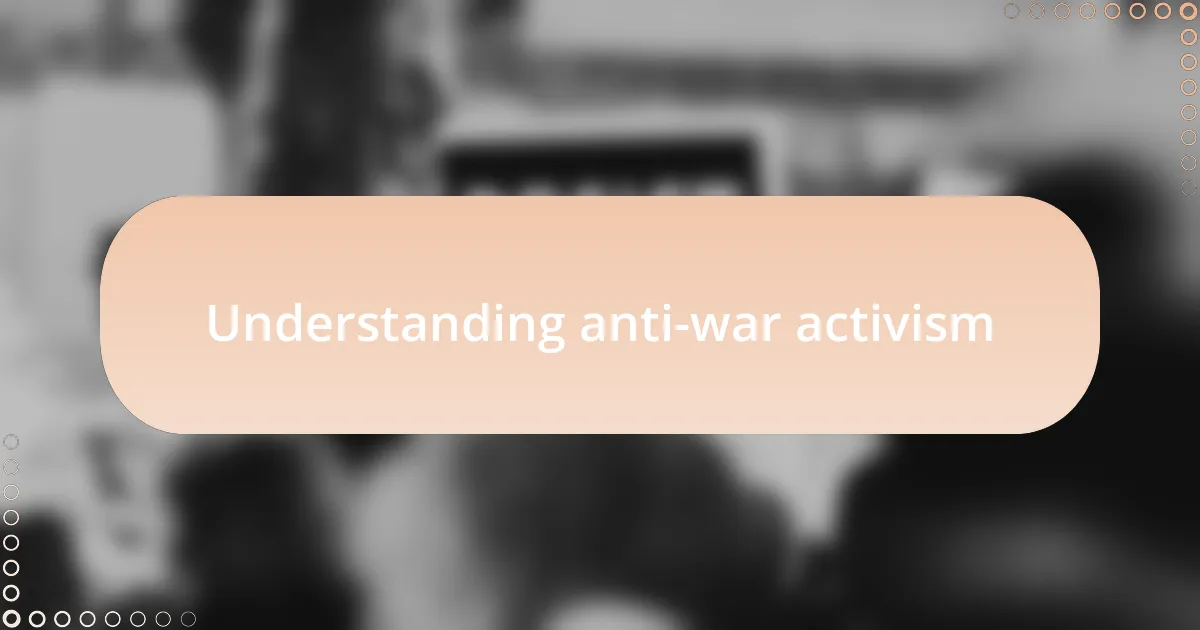
Understanding anti-war activism
Anti-war activism has always resonated with me, stemming from a deep belief that peace is a fundamental human right. I still remember attending my first rally; the energy was electric, filled with passionate voices demanding an end to violence. Can you imagine standing in a crowd that truly believes change is possible? That feeling of unity and purpose is what drives the movement forward.
Many activists see war as a symptom of deeper socio-political issues rather than an isolated event. Reflecting on my journey, I’ve encountered diverse perspectives on how economic interests often fuel conflicts. Doesn’t it make you wonder how many everyday lives are impacted by decisions made behind closed doors, far removed from the battlefield?
Engaging in discussions about anti-war activism has opened my eyes to the emotional toll that conflict inflicts, not just on those directly involved but on entire communities. I recall speaking with a Vietnam War veteran whose stories of loss and regret still haunt him. How can we ignore the voices of those who have lived through the trauma? It’s this personal connection that enhances our understanding of anti-war activism, transforming abstract concepts into urgent realities.
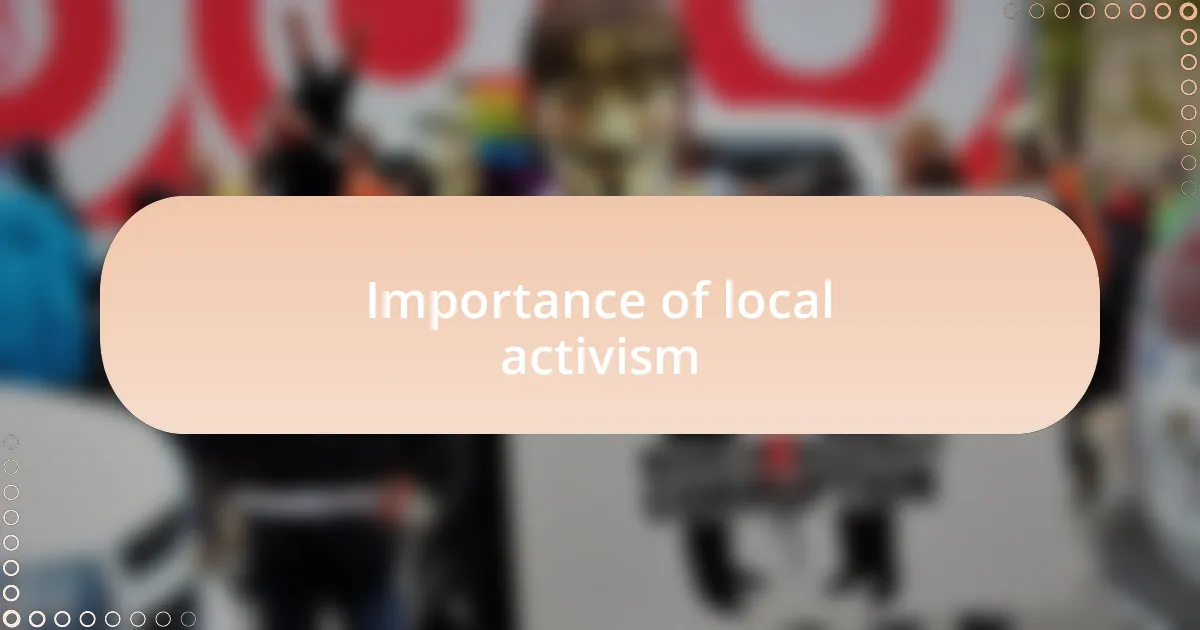
Importance of local activism
Local activism plays a crucial role in shaping the broader movement for peace. I remember my first neighborhood meeting where we discussed ways to raise awareness about the impact of local decisions on global conflicts. The conversations that took place illuminated just how interconnected our lives are; it was a stark reminder that even small actions can ripple outwards, affecting many.
Being involved at the local level provides a platform to amplify marginalized voices. I once participated in a community forum where a mother shared her story about losing her son to war. Listening to her discuss the personal costs of political decisions was a profound moment that underscored why local activism is essential. It made me question: how often do we hear these stories when the focus is solely on national headlines?
Moreover, local activism fosters a sense of belonging and unity among participants. I’ve found that working alongside others who share similar values creates a powerful support system. It transforms frustration into action, allowing us to brainstorm and implement tangible solutions together. Isn’t it inspiring how grassroots initiatives can spark significant change from the ground up?
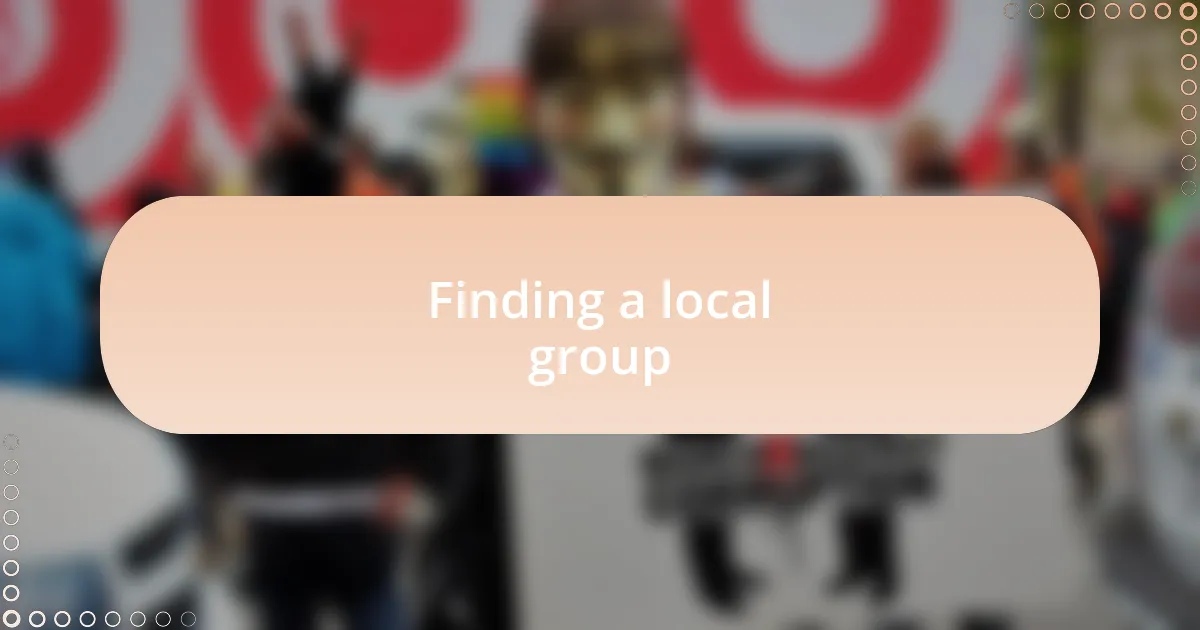
Finding a local group
Finding a local group can often feel overwhelming, but I learned that starting with online searches or social media platforms can really help narrow down options. I remember scrolling through a local Facebook group dedicated to peace activism and being pleasantly surprised by the vibrant discussions happening there. I thought, “Could these ordinary people make a real difference?” and soon discovered they were already doing just that.
When I finally attended a meeting with one of the local groups, I was struck by the diversity of backgrounds and stories that filled the room. It was eye-opening to realize that each person brought their unique perspective to the table, shaping the mission of our collective efforts. Thinking back, I felt an unfamiliar sense of hope; participating in this gathering reminded me how powerful community can be.
One valuable tip I’d share is to reach out to group members beforehand. I did this once, and a welcoming member took the time to share their experiences. It eased my anxiety about walking into a room full of strangers. I can’t help but wonder: how many potential friendships and allies might be waiting just outside our comfort zones? Engaging with these individuals ultimately deepened my commitment to activism.
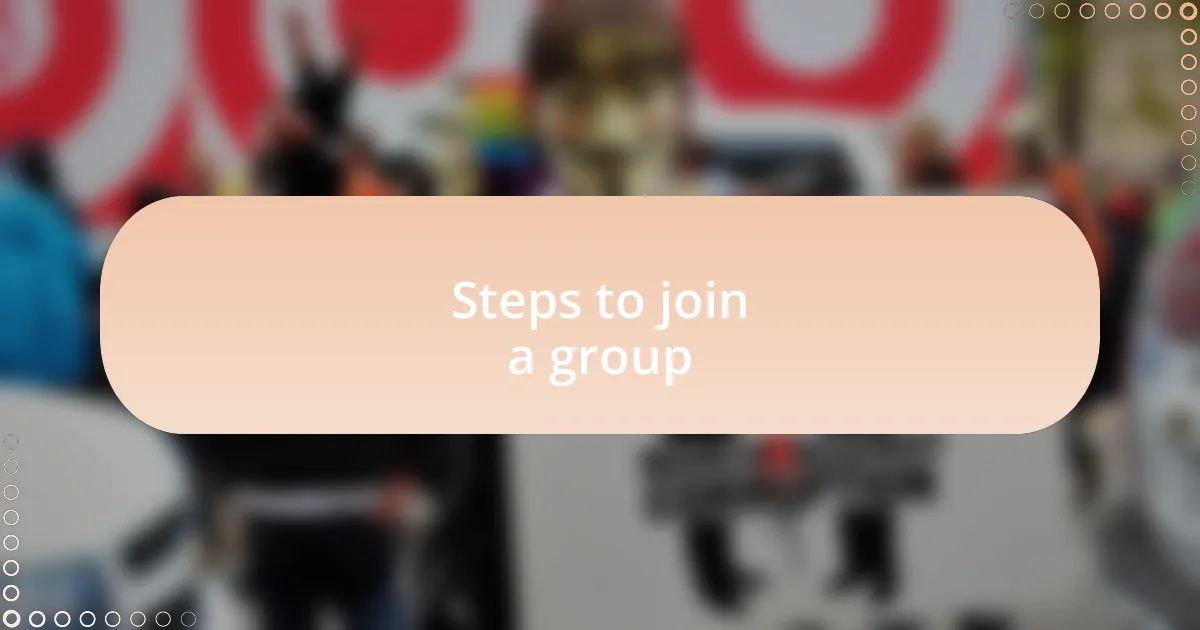
Steps to join a group
After deciding to join a local anti-war group, my first step was researching them online to get a feel for their values and activities. I vividly recall sifting through their mission statements; one in particular resonated with me, urging members to confront the injustices of war through education and outreach. It made me think, what could I contribute to such a cause?
Once I narrowed down my choices, I reached out directly to a few members via email. I remember feeling hesitant, but their responses were warm and inviting, making me feel like a part of the family even before I physically stepped into a meeting. Have you ever experienced that blend of excitement and nervousness? That feeling of being on the cusp of something meaningful can be both daunting and exhilarating.
Finally, attending my first meeting was a whirlwind of emotions. As I walked through the door, I could feel my heart racing, accompanied by the familiar twinge of anxiety. But as conversations flowed and ideas sparked, I discovered how crucial it is to participate actively. Engaging with others about our shared purpose fostered connections that transformed that initial nervousness into a sense of belonging. Why wait any longer to dive in and be part of something greater?
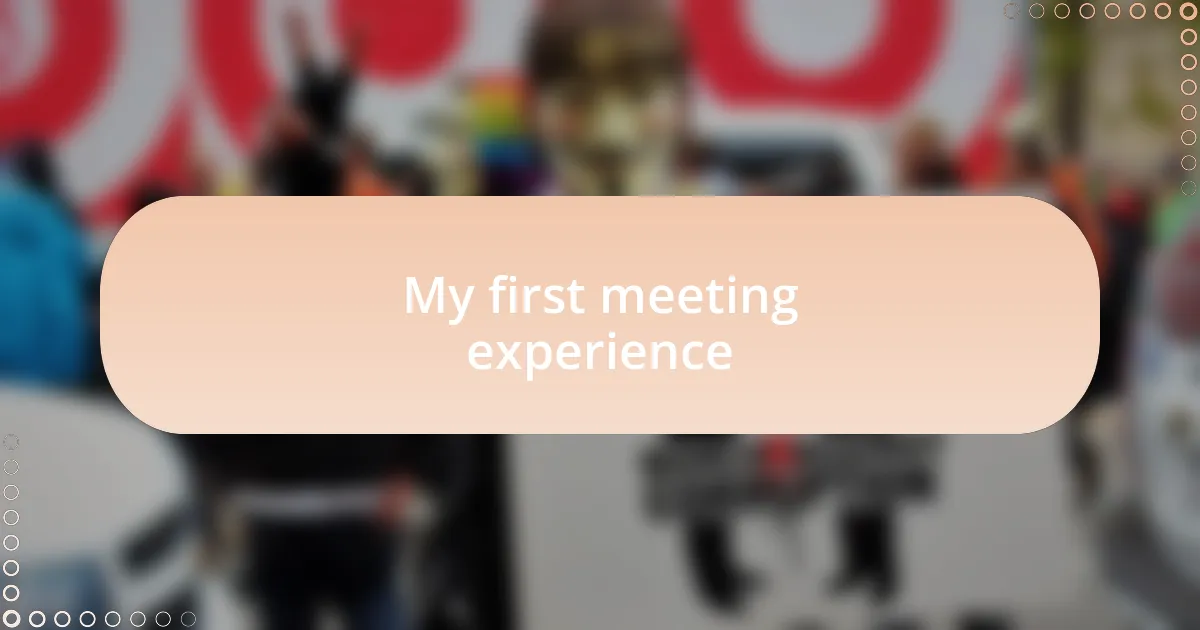
My first meeting experience
Walking into that first meeting, I could feel the energy in the room—a unique blend of determination and hope. I remember spotting a circle of people, each sharing their thoughts with passion, and I felt like a spectator at a groundbreaking event. What would I contribute? Would my voice matter in this vibrant tapestry of activism?
As the meeting progressed, the atmosphere shifted. I found myself nodding along, fully engrossed in discussions about the devastating impacts of war. I couldn’t help but recall how many times I had stayed silent in conversations about such issues before, but here, in this space, I felt empowered to share my perspective. It was a revelation that maybe my thoughts and experiences, however small, could add value to our collective mission.
By the end of the evening, I realized I had not just joined a local group; I had stepped into a community that felt like home. As I left the meeting, I felt a swell of motivation inside me—what if this was just the beginning? How many lives could we touch together with unwavering dedication and shared stories? This exhilarating sense of purpose was something I had long sought, and it was alive in that room, echoing in my mind long after I walked out the door.
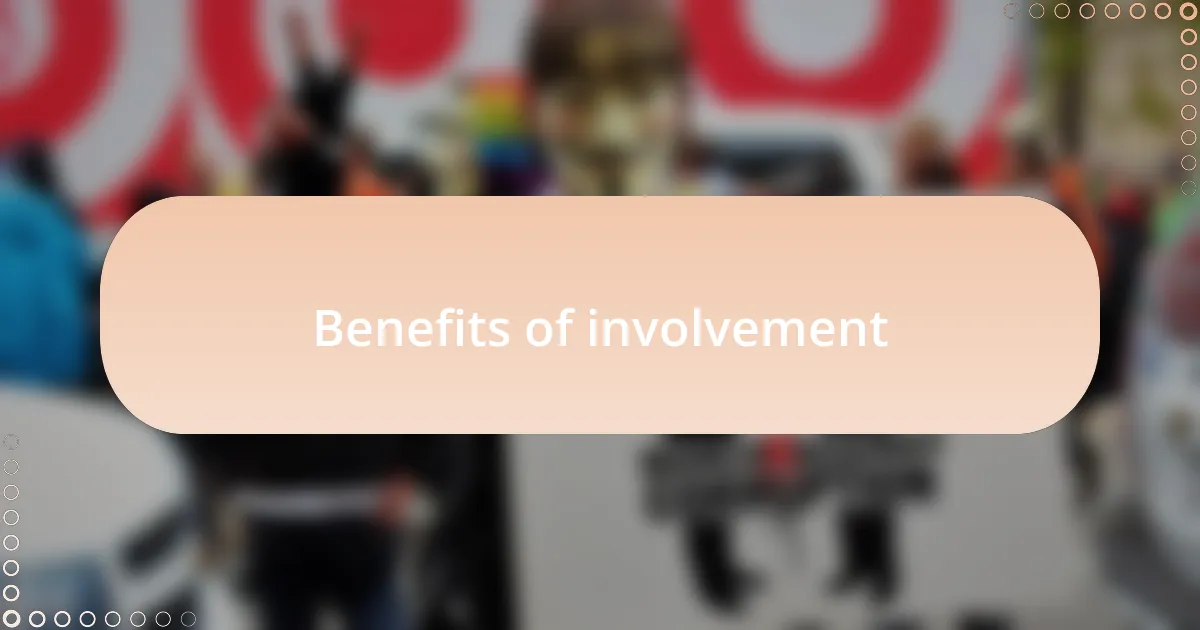
Benefits of involvement
Engaging in a local anti-war group brought be numerous benefits that I hadn’t expected. One of the most significant was the sense of solidarity. I recall a moment during one discussion when someone shared a heart-wrenching story about lost friends to war. Hearing those visceral accounts reminded me that I wasn’t alone; we were all fighting for a common cause. It’s powerful to feel connected with others who share not only your concern but also your passion for change.
Another surprising benefit was the wealth of knowledge I gained. Through our meetings, I was introduced to various perspectives and resources, from historical context to current events that influence anti-war movements. I remember leafing through an eye-opening report one member had printed out. It made me realize how vital it is to stay informed and how much there is to learn from each other. This ongoing education gave me the confidence to engage in deeper conversations about the issues at hand.
Perhaps one of the more personal rewards was developing my speaking skills. Initially, I was hesitant to share my thoughts, but with each meeting, I found myself voicing my opinions more openly. I vividly recall the adrenaline rush I felt after presenting my ideas during a brainstorming session. That moment of vulnerability transformed into a profound strength. I learned that my personal experiences could not only help me articulate my position but also resonate with others. Isn’t it amazing how being part of a group can shift our perspectives and equip us with the tools to advocate more confidently?
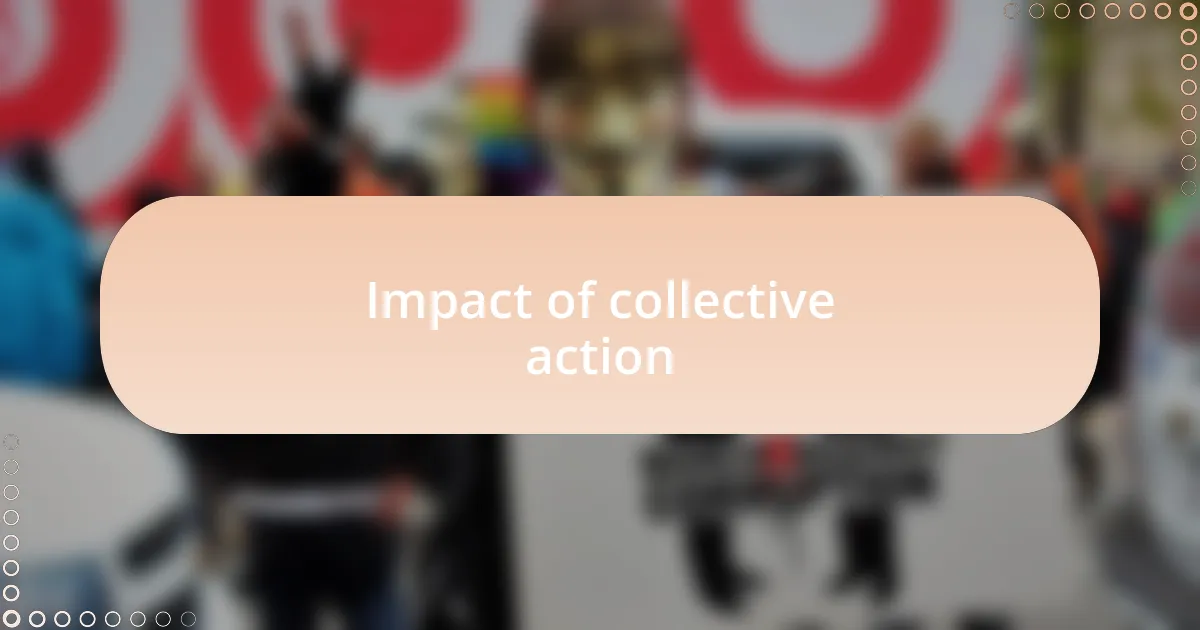
Impact of collective action
When I first joined the local anti-war group, I underestimated the seismic shift collective action could produce. I remember attending a peaceful protest, standing shoulder to shoulder with fellow activists. The energy in the air was electric, and as we chanted in unison, I felt an overwhelming sense of purpose. It struck me that individual voices could become a powerful chorus, capable of drawing attention to injustices that often go unnoticed.
As we collaborated on projects, I saw firsthand how collective efforts could amplify our message. One memorable day, we organized a local awareness event that brought in a surprisingly large crowd. The stories and experiences shared by attendees sparked conversations that led to meaningful connections. I couldn’t help but think: how often do we underestimate our combined strength? It’s incredible to realize that together, we can not only influence public opinion but also foster a community dedicated to peace.
Reflecting on those experiences, I began to understand that collective action breeds resilience. When challenges arose, it was the support of my fellow activists that kept me going. I vividly recall a particularly discouraging setback when our petition didn’t receive the attention we hoped for. Yet, instead of feeling defeated, we rallied together, brainstormed new strategies, and ultimately came back stronger. Would I have had that determination alone? Probably not. Being part of a group instilled in me a sense of shared responsibility and commitment to our cause, proving just how impactful collective efforts can be.